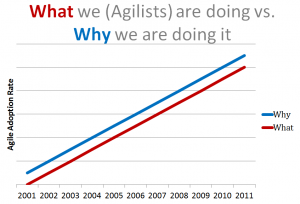During my session at the AgileDC conference, I talked about the past, present, and future of Agile. I drew a parallel between the adoption curve of Agile and Geoffrey Moore's adoption curve of technology. Even before the Agile Manifesto was penned, there were Innovators introducing agile practices and mindsets. In the last ten years, the early adopters and visionaries have taken Agile to the next step of market acceptance. I'll admit, I only started using agile practices about 6 years ago. During that time, as acceptance of Agile has grown, the Agile "mantra" has been relatively consistant. I like to use the word mantra because Agile really does create a transformation. If the values and principles of the Manifest resonate with you, you become an adopter, a proponent, and a member of a community.

The Agile community is a self-organized group of like-minded people and market adoption has been very organic. So, back to my session at AgileDC. I wanted to make a point of saying that Agilists do what they do because something resonates within them. What we are doing, as Agilists, feels like it aligns with why we do it. We want to deliver more value. We want more interactions and collaborations. We respond to change.
Now, let's look at the Project Management community, specifically that group related to the Project Management Institute. The primary difference between the PMI community and the Agile community is Project Managers don't appear to be joined by a common cause. Rather, they are joined by a common certification. PMI's goal is
“Serve practitioners and organizations with standards that describe good practices, globally recognized credentials that certify project management expertise, and resources for professional development, networking and community.“
While I was doing research for my AgileDC session, I came across an interesting fact. What Project Managers (associated with PMI) are doing does not align with why they are doing it. Scan the blogoshere and you'll find less content about how to become a better project manager and more about how to pass the Project Management Professional (PMP®) exam. Though the graph above about Agile Adoption is subjective, the graph below is not.

Something happened in February 2008. It was the last time there were more members of PMI than there were PMPs. (260,458 vs. 259,694) Since then, the gap has widened to 366,854 PMI members and over 466,163 PMPs. Project managers, associated with PMI, find more value in a certification than they do being a member of a community. But can you blame them? Job listings require certifications or accreditations. Hiring managers search for acronyms and not people. The simple truth is some are pursuing the mastery of performance-based objectives versus learning-based objectives (ie. getting a passing score on an exam versus getting better at a craft). Since credential holders don't have to be a member of the community to maintain their PMP status, they dropped their memberships. If not for the fact that I could not be a member of the PMI Agile Community of Practice without being a member of PMI, I would probably have ended my membership as well. But, that alone is enough for me to stay.
The Agile Community of Practice (CoP) and it's leadership are self-organized. I get a different vibe from them than I do others associated with PMI. It's less about how do I maintain my certification and more about how can we help others. It is my hope that as the Agile CoP grows, its servant leadership and passion will spread to other areas of PMI.
With the PMI-ACP certification, I'm very curious how this will impact the Agile community and the PMI community. When I did my last PMI-ACP prep class, 66% of my learners were PMPs and 33% of the class was not associated with PMI at all. Will the PMI-ACP just be another group of letters to appear in a hiring manager's keyword search or will it become more than that? I truly hope it is the latter.
If you are a member of PMI, I strongly recommend that you join the Agile Community of Practice (it's free for PMI members). The writing is on the wall, people. It's a sign of things to come. What if you are a PMP but not a member of PMI? I think joining the Agile CoP is worth the price of the membership. Regardless of what happens at PMI, Agile will continue to be an ever-evolving self-organized force.